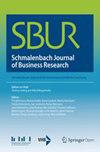Toward a Methodology for Social Sustainability Assessment: a Review of Existing Frameworks and a Proposal for a Catalog of Criteria
Q3 Economics, Econometrics and Finance
Schmalenbachs Zeitschrift fur Betriebswirtschaftliche Forschung
Pub Date : 2023-11-14
DOI:10.1007/s41471-023-00174-y
引用次数: 0
Abstract
Abstract Social sustainability and, in particular, its measurement and reporting are gaining importance in society, politics and business but are facing major challenges. This is because there are no standardized and uniform approaches or frameworks. The existing approaches cover social issues, but no systematic presentation has been proposed. Moreover, there is no approach that can be applied in both management accounting and financial reporting. The aim of this paper is to present a catalog of criteria for addressing this issue and thus to close the research gap. For this purpose, frameworks utilizing catalogs of criteria for social sustainability assessment and reporting are analyzed and critically reviewed. One major weakness found is that all frameworks are oriented around only socially protected values in their catalogs. As social sustainability is focused on the impact on stakeholders, these are frequently missed. One solution to this problem is to adopt a 1:1 ratio of socially protected values to stakeholders, which is developed and described in this paper via a catalog of criteria. Furthermore, a systematic presentation of social issues using a four-level structure is proposed. Social indicators are, in turn, assigned to subcategories, to supercategories, and finally to stakeholders. This not only improves transparency and comprehensibility but also simplifies decision-making. A procedure model for the application of the catalog is also suggested. Such a catalog has not been described in previous research.迈向社会可持续性评估的方法:对现有框架的审查和标准目录的建议
社会可持续性,特别是其测量和报告在社会、政治和商业中越来越重要,但也面临着重大挑战。这是因为没有标准化和统一的方法或框架。现有的方法涵盖了社会问题,但没有提出系统的介绍。此外,没有一种方法可以同时适用于管理会计和财务报告。本文的目的是提出解决这一问题的标准目录,从而缩小研究差距。为此目的,对利用社会可持续性评估和报告标准目录的框架进行了分析和严格审查。我们发现的一个主要弱点是,所有框架都只围绕其目录中受社会保护的价值观。由于社会可持续性关注的是对利益相关者的影响,这些往往被忽略。这个问题的一个解决方案是采用社会保护价值与利益相关者的1:1比例,本文通过一系列标准开发和描述了这一比例。此外,本文还提出了一种使用四层结构的社会问题的系统描述。社会指标依次分配给子类别、超类别,最后分配给利益相关者。这不仅提高了透明度和可理解性,而且简化了决策。提出了应用该目录的过程模型。这样的目录在以前的研究中还没有描述过。
本文章由计算机程序翻译,如有差异,请以英文原文为准。
求助全文
约1分钟内获得全文
求助全文
来源期刊

Schmalenbachs Zeitschrift fur Betriebswirtschaftliche Forschung
Economics, Econometrics and Finance-Economics, Econometrics and Finance (all)
CiteScore
2.10
自引率
0.00%
发文量
15
期刊介绍:
Schmalenbach Journal of Business Research (SBUR) is the joint official journal of Schmalenbach-Gesellschaft für Betriebswirtschaft e.V. and Verband der Hochschullehrer für Betriebswirtschaft e.V. (VHB), replacing the associations‘ former official journals Business Research (BuR), Schmalenbach Business Review (SBR), and building on Schmalenbachs Zeitschrift für betriebswirtschaftliche Forschung (ZfbF). The three journals were merged to form SBUR and ceased to publish under their previous names. SBUR publishes in the English language only.
SBUR is a fully Open Access journal. For information on the publication fees, please go to the Journal Updates section below and read the Note on the Publication Fee.
More information on SBUR and its predecessor journals, including links to their previously published content, can be found in the Journal Updates section as well.
About SBUR
Schmalenbach Journal of Business Research (SBUR) is an international English-language journal that publishes original high-quality research that is of wide interest to business research and practice. Its scope includes traditional and emerging business administration areas, including among others accounting, finance, marketing, strategic management, organization, human resource management, production and logistics management, taxation, digital business, and entrepreneurship. SBUR is open for cross-disciplinary and multi-disciplinary research. State-of-the-art review articles and thought pieces are welcome as well.
Articles apply rigorous research methodologies that fit the research questions to establish their scientific findings, such as analytical modeling, archival empirical and experimental, field and case research. To ensure high-quality scientific standards, articles submitted to SBUR are subject to a rigorous double-blind peer review, that is, reviewers are anonymous to the authors and do not see the names or affiliations of the authors.
SBUR endorses the Open Science philosophy and operates under Gold Open Access, so all published articles are freely and permanently available and accessible through this website.
 求助内容:
求助内容: 应助结果提醒方式:
应助结果提醒方式:


